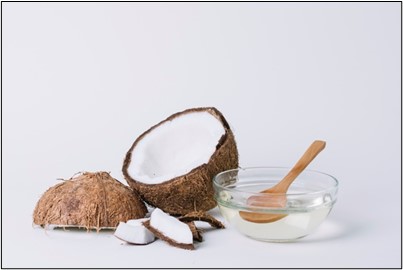Coconut oil is the edible oil extracted from mature coconut and considered as one of the most important body friendly food stuffs. The fatty acid content of coconut oil is the key factor associated with enhancing the overall health status of an individual. It generally helps to boost up metabolism, increases HDL level, reduces body fat percentage, promotes the health of central nervous system and provides quick energy hence consumption of coconut oil (as per recommendation) is a healthy choice.
Chemistry and nutritional composition of coconut oil
- Coconut oil is mainly consisting of lauric acid (C12), myristic acid (C14) and palmitic acid (C16) among which lauric acid is found in maximum amount. It is considered as a rich source of saturated fatty acid, which is the main causative factor of developing LDL level in bodyIt contains very low amount of mono and poly unsaturated fatty acids
- It contains long chain and medium chain triglycerides, among which the medium chain triglyceride has great health importance
- It does not contain cholesterol and fibre
- It contains too some extent of vitamins and minerals within it
- It also contains plant sterol which is made up of polyphenols and responsible for its antioxidant property. It helps to protect the body from oxidative damages
- It is liquid in room temperature
- It is colorless
- It is safe to use in high temperature cooking process like deep frying as it can retain its structure in high temperature and does not converted into toxic compound during heating

Health benefits
Role on metabolism
- The medium chain triglyceride (MCT) of coconut oil has an intense relation with metabolism
- It helps to generate instant energy as the MCT of coconut oil can rapidly absorbed and metabolized, so it can able to generate instant energy
- It is also associated with increasing the catabolic rate of the body
Role on dental health
- Streptococcus mutans is the main causative factor responsible for developing harmful dental disorders like gum diseases, dental plaque formation, gingivitis and tooth decay. Coconut oil can be used to prevent these kinds of disorders as it is associated with preventing the growth of that respective bacterium
- It is widely used in oil pulling where it is swishing around the cavities and helps to reduce gum inflammation and bacterial infestation within mouth. It is as effective as mouthwash

Role on nervous system
- The MCT found in coconut oil helps to improve brain function and it is associated with decreasing the susceptibility of Alzheimer’s disease and epilepsy
- It has seen that in hypoglycemia, brain cannot function properly as brain only utilizes glucose as its energy source. So decrease in plasma glucose level affects the brain adversely. Consumption of coconut oil helps to prevent this complication as the MCT of coconut oil helps to produce ketone, which acts as an alternative energy source for brain and promotes brain functioning

Role on preventing obesity
- It acts as a significant preventive measure for obesity. The MCT content of coconut oil is related with increasing catabolism, which is responsible for enhancing energy expenditure that leads to generating a negative energy balance within body and facilitates weight reduction
- MCT also helps to reduce hunger results in reduced food intake which is also related with weight reduction
- It has seen that coconut oil is beneficial for reducing the belly fat
Role on skin
- It acts as an effective moisturizer for skin and its mineral oil content is responsible for providing proper nourishment to the skin
- Applying coconut oil on skin also acts as a protective barrier that helps to reduce the risk of external injuries
- It helps to prevent dermatitis, crack heal, dry skin, eczema and related skin disorders
- It also helps to protect the skin from the harmful effect of UV rays as it contains sun protection factor

Role on hair
- The lauric acid (SFA) content of coconut oil helps in hair growth as it penetrate the hair shaft more effectively than other oils and provides nourishment
- It helps to decrease the losses of protein from hair leads to decrease hair falls
- It also helps to increase the shine of the hair
Role on preventing infection
- The lauric acid content of coconut oil is responsible for the antimicrobial activity. It helps to prevent the growth and multiplication of several bacteria and fungus
- It has seen that coconut oil is most effective substances to inhibit the growth of Candida albicans (yeast), which is responsible for developing chronic infection especially in the moist area of body such as mouth and vagina. So, coconut oil may be used as a preventive measure to treat these types of infections
Other health benefits
- It helps to increase the concentration of high density lipoprotein (HDL) in body
- The polyphenol components of coconut oil has antioxidant and anti-inflammatory property
- It is associated with decreasing stress and depression
- It also helps to enhance collagen synthesis and helps in rapid healing of wounds
- It is related with increasing insulin sensitivity and helps to reduces the risk of developing type 2 diabetes mellitus

Controversy
Coconut oil and cardiac health is one of the most controversial issues in the field of food and nutrition. Recent studies and researches have shown that consumption of saturated fatty acid is not good for health as it is responsible for increasing LDL level which results in developing arthrosclerosis and cardio vascular diseases. Coconut oil contains significant amount of saturated fatty acids which is related with enhancing the LDL concentration within body and contributes for developing cardio vascular diseases, so consumption of coconut oil is not a healthy choice for individual suffers from cardiac problems (Sacks, 2020).
On a contrary, coconut oil is considered as healthy oil, especially its MCT content makes it healthier. It has seen that coconut oil is also associated with increasing the HDL level in human and has no effect on triglyceride level that is related with promoting cardiac health. Increased HDL level helps to absorb LDL and transport it to liver hence reduces the concentration of LDL in blood results in decreasing the susceptibility of developing artherosclerosis and cardio vascular diseases.
Usage
Coconut oil can be utilized in various ways, which include –
- It can be used to prepare Mayonnaise
- It can also used for preparing energy drink as it provides instant energy for its MCT content
- It can able to remove stain easily hence it can be used as stain remover
- It can be used as a lip balm
- It can be also used as cooking oil
- It is widely used in cosmetics sector to produce hair oil, body lotion and moisturizer cream

Risk factors
Consumption of too much coconut oil has several adverse effects on health, which include –
- Fatigue
- Dizziness
- Chills
- Muscle pain
- Headache
- Joint pain
- Rashes and related skin disorders
- Swollen gland
- According to American heart association the recommendation for daily dietary intake of saturated fatty acid is less than 6% of total energy intake. As coconut oil is rich in saturated fatty acid hence consuming it excessively can develop metabolic syndromes like obesity and cardio vascular disease

Source:
Krist, S., 2020. Coconut Oil. In Vegetable Fats and Oils (pp. 247-253). Springer, Cham.
Lockyer, S. and Stanner, S., 2016. Coconut oil–a nutty idea?. Nutrition Bulletin, 41(1), pp.42-54.
Rajamohan, T. and Archana, U., 2018. Nutrition and Health Aspects of Coconut. In The Coconut Palm (Cocos nucifera L.)-Research and Development Perspectives (pp. 757-777). Springer, Singapore.
Sacks, F.M., 2020. Coconut Oil and Heart Health: Fact or Fiction?.
Sankararaman, S. and Sferra, T.J., 2018. Are we going nuts on coconut oil?. Current nutrition reports, 7(3), pp.107-115.
Shedden, R., 2017. Effect of a Coconut Oil Supplement (2g/d) on Total Cholesterol to HDL Cholesterol Ratio in Healthy Adults. Tempe, AZ: Arizona State University.
Teng, M., Zhao, Y.J., Khoo, A.L., Yeo, T.C., Yong, Q.W. and Lim, B.P., 2020. Impact of coconut oil consumption on cardiovascular health: a systematic review and meta-analysis. Nutrition Reviews, 78(3), pp.249-259.
Wallace, T.C., 2019. Health effects of coconut oil—A narrative review of current evidence. Journal of the American College of Nutrition, 38(2), pp.97-107.


